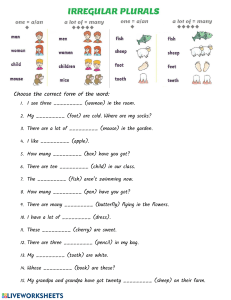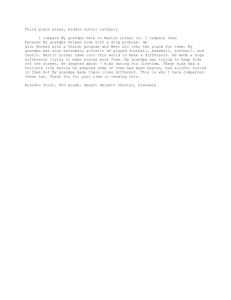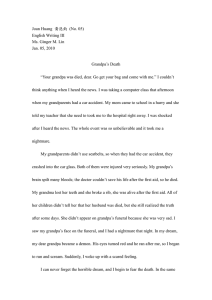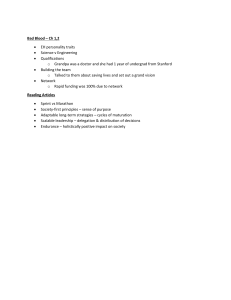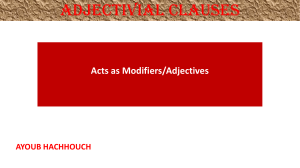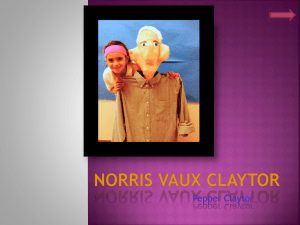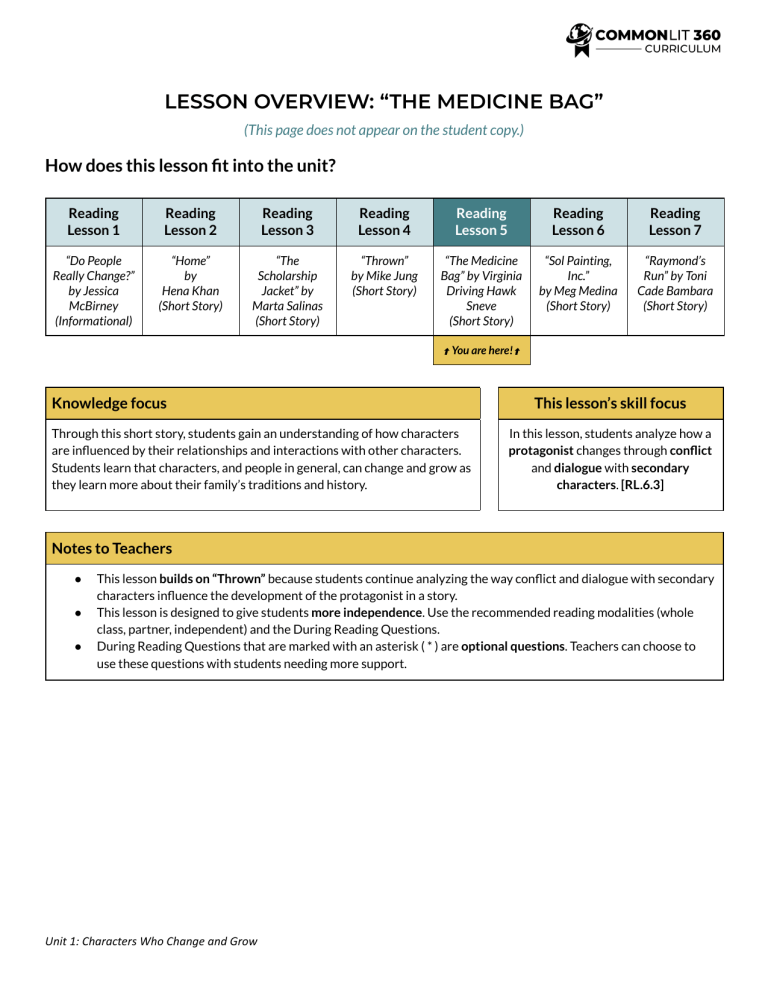
LESSON OVERVIEW: “THE MEDICINE BAG” (This page does not appear on the student copy.) How does this lesson fit into the unit? Reading Lesson 1 Reading Lesson 2 Reading Lesson 3 Reading Lesson 4 Reading Lesson 5 Reading Lesson 6 Reading Lesson 7 “Do People Really Change?” by Jessica McBirney (Informational) “Home” by Hena Khan (Short Story) “The Scholarship Jacket” by Marta Salinas (Short Story) “Thrown” by Mike Jung (Short Story) “The Medicine Bag” by Virginia Driving Hawk Sneve (Short Story) “Sol Painting, Inc.” by Meg Medina (Short Story) “Raymond’s Run” by Toni Cade Bambara (Short Story) ⬆ You are here!⬆ Knowledge focus Through this short story, students gain an understanding of how characters are influenced by their relationships and interactions with other characters. Students learn that characters, and people in general, can change and grow as they learn more about their family’s traditions and history. This lesson’s skill focus In this lesson, students analyze how a protagonist changes through conflict and dialogue with secondary characters. [RL.6.3] Notes to Teachers ● ● ● This lesson builds on “Thrown” because students continue analyzing the way conflict and dialogue with secondary characters influence the development of the protagonist in a story. This lesson is designed to give students more independence. Use the recommended reading modalities (whole class, partner, independent) and the During Reading Questions. During Reading Questions that are marked with an asterisk ( * ) are optional questions. Teachers can choose to use these questions with students needing more support. Unit 1: Characters Who Change and Grow Suggested Pacing Part Lesson Activities Time Intro Slide Deck Guide students through the slide deck to introduce them to the reading lesson and skill focus. 5 min During Reading Questions Students read and answer the During Reading Questions. 55 min Independent Practice Students complete multiple choice questions and a short answer prompt to measure their understanding of the text. 20 min Student-Led Discussion Students practice speaking with academic language as they discuss questions about the text with a partner. 5 min ~85 min total How do I facilitate this lesson? Option 1 Teacher-led, scaffolded and supportive ● Use the recommended reading modalities (whole class, partner, independent). ● `Pause to answer the During Reading Questions during reading. 85 total minutes for this lesson ⬆ Recommended!⬆ Unit 1: Characters Who Change and Grow Option 2 Option 3 Greater student independence Student-led, small groups ● Assign longer chunks of independent reading. ● Skip some supportive During Reading Questions ● Instruct students to take notes independently: As you read, take notes on Martin’s changing attitude toward his grandfather. ● Put students into groups of 3-5. ● Students answer the During Reading Questions and alternate readers to read sections aloud. ● Circulate to check for understanding. Name Class TEACHER COPY: The Medicine Bag Virginia Driving Hawk Sneve *Answers in blue. To help us ensure assessment security, please do not post or circulate these answers online.* About this Text Virginia Driving Hawk Sneve is a member of the Rosebud Sioux Tribe and writes children’s books that focus on the experiences of Native Americans. In this short story, a boy’s Sioux grandpa visits with the intention of giving him a medicine bag, a small leather bag that contains holy items, herbs, and family symbols. A person wears a medicine bag under their clothes to bring them protection and good health. Vocabulary Let’s pronounce these words together as a class: Burden [bur-dn] Despair [dih-spair] Reluctant (ri-luhk-tuhnt) WHOLE CLASS READING DURING READING QUESTIONS [1] My kid sister Cheryl and I always bragged about our Sioux1 grandpa, Joe Iron Shell. Our friends, who had always lived in the city and only knew about Indians from movies and TV, were impressed by our stories. Maybe we exaggerated and made Grandpa and the reservation2 sound glamorous, but when we’d return home to Iowa after our yearly summer visit to Grandpa, we always had some exciting tale to tell. Paragraphs 1-2 Find Evidence: Highlight two details that reveal how the narrator feels about his grandfather. ● “I always bragged about our Sioux grandpa” (1) ● “we always had some exciting tale to tell” (1) ● “Man, that really made an impression” (2) [2] We always had some authentic Sioux article to show our listeners. One year Cheryl had new moccasins3 that Grandpa had made. On another visit he gave me a small, round, flat rawhide drum which was decorated with a painting of a warrior riding a horse. He taught me a real Sioux chant to sing while I beat the drum with a leather-covered stick that had a feather on the end. Man, that really made an impression. [3] We never showed our friends Grandpa’s picture. Not that we were ashamed of him, but because we knew that the glamorous tales we told didn’t go with the real thing. Our friends would have laughed at the picture, because Grandpa wasn’t tall and stately like TV Indians. His hair wasn’t in braids but hung in stringy gray strands on his neck, and he was old. He was our great-grandfather, and he didn’t live in a tepee, but all by himself in a part log, part tar-paper shack on the Rosebud Reservation in South Dakota. So when Grandpa came to visit us, I was so ashamed and embarrassed I could’ve died. Paragraphs 3-6 *Write: Describe the conflict the narrator is experiencing in the story. ● The narrator exaggerated the stories about his grandfather, so when his grandfather comes to visit, he is embarrassed for others to see what his grandfather is really like. 1 multiple groups of Native Americans whose territory spanned much of the upper Midwest land set aside by the U.S. government for a Native American Indian tribe to live on 3 a soft leather shoe 2 Unit 1: Characters Who Change and Grow 1 Unless otherwise noted, this content is licensed under the CC BY-NC-SA 4.0 license [4] There are a lot of yippy poodles and other fancy little dogs in our neighborhood, but they usually barked singly at the mailman from the safety of their own yards. Now it sounded as if a whole pack of mutts were barking together in one place. [5] I got up and walked to the curb to see what the commotion was. About a block away I saw a crowd of little kids yelling, with the dogs yipping and growling around someone who was walking down the middle of the street. [6] I watched the group as it slowly came closer and saw that in the center of the strange procession4 was a man wearing a tall black hat. He’d pause now and then to peer at something in his hand and then at the houses on either side of the street. I felt cold and hot at the same time as I recognized the man. “Oh, no!” I whispered. “It’s Grandpa!” [7] I stood on the curb, unable to move even though I wanted to run and hide. Then I got mad when I saw how the yippy dogs were growling and nipping at the old man’s baggy pant legs and how wearily he poked them away with his cane. “Stupid mutts,” I said as I ran to rescue Grandpa. [8] When I kicked and hollered at the dogs to get away, they put their tails between their legs and scattered. The kids ran to the curb, where they watched me and the old man. [9] “Grandpa,” I said, and felt pretty dumb when my voice cracked. I reached for his beat-up old tin suitcase, which was tied shut with a rope. But he set it down right in the street and shook my hand. [10] “Hau, Takoza, Grandchild,” he greeted me formally in Sioux. [11] All I could do was stand there with the whole neighborhood watching and shake the hand of the leather-brown old man. I saw how his gray hair straggled from under his big black hat, which had a drooping feather in its crown. His rumpled black suit hung like a sack over his stooped frame. As he shook my hand, his coat fell open to expose a bright-red satin shirt with a beaded bolo tie under the collar. His get-up wasn’t out of place on the reservation, but it sure was here, and I wanted to sink right through the pavement. [12] “Hi,” I muttered with my head down. I tried to pull my hand away when I felt his bony hand trembling, and looked up to see fatigue5 in his face. I felt like crying. I couldn’t think of anything to say, so I picked up Grandpa’s suitcase, took his arm, and guided him up the driveway to our house. [13] Mom was standing on the steps. I don’t know how long she’d been watching, but her hand was over her mouth and she looked as if she couldn’t believe what she saw. Then she ran to us. Paragraph 11 A. Find Evidence: Highlight three details about Grandpa’s appearance. ● “leather-brown old man” ● “gray hair straggled from under his big black hat, which had a drooping feather in its crown” ● “rumpled black suit hung like a sack over his stooped frame” ● “bright-red satin shirt with a beaded bolo tie” B. Write: How is the narrator affected by Grandpa’s appearance? ● It has made the narrator feel very embarrassed. He wishes no one could see him with his grandpa. [14] “Grandpa,” she gasped. “How in the world did you get here?” [15] She checked her move to embrace Grandpa, and I remembered that such a display of affection is unseemly to the Sioux and would embarrass him. [16] “Hau, Marie,” he said as he shook Mom’s hand. She smiled and took his other arm. 4 5 Procession (noun): people moving forward in an orderly fashion, like a parade Fatigue (noun): tiredness Unit 1: Characters Who Change and Grow 2 Unless otherwise noted, this content is licensed under the CC BY-NC-SA 4.0 license [17] As we supported him up the steps, the door banged open and Cheryl came bursting out of the house. She was all smiles and was so obviously glad to see Grandpa that I was ashamed of how I felt. [18] “Grandpa!” she yelled happily. “You came to see us!” [19] Grandpa smiled and Mom and I let go of him as he stretched out his arms to my ten-year-old sister, who was still young enough to be hugged. [20] “Wicincala, little girl,” he greeted her, and then collapsed. INDEPENDENT READING DURING READING QUESTIONS [21] He had fainted. Mom and I carried him into her sewing room, where we had a spare bed. [22] After we had Grandpa on the bed, Mom stood there helplessly patting his shoulder. [23] “Shouldn’t we call the doctor, Mom?” I suggested, since she didn’t seem to know what to do. [24] “Yes,” she agreed, with a sigh. “You make Grandpa comfortable, Martin.” [25] I reluctantly moved to the bed. I knew Grandpa wouldn’t want to have Mom undress him, but I didn’t want to, either. He was so skinny and frail6 that his coat slipped off easily. When I loosened his tie and opened his shirt collar, I felt a small leather pouch that hung from a thong around his neck. I left it alone and moved to remove his boots. The scuffed old cowboy boots were tight and he moaned as I put pressure on his legs to jerk them off. I put the boots on the floor and saw why they fit so tight. Each one was stuffed with money. I looked at the bills that lined the boots and started to ask about them, but Grandpa’s eyes were closed again. CHARACTER CHANGE: Paragraphs 23-25 *Write: What do Martin’s actions reveal about his feelings towards Grandpa in this section? ● Answers will vary. Students may note that Martin cares about making Grandpa comfortable, or that he feels bad Grandpa went through so much to get to Martin’s house. [26] Mom came back with a basin of water. “The doctor thinks Grandpa is suffering from heat exhaustion,” she explained as she bathed Grandpa’s face. Mom gave a big sigh, “Oh hinh, Martin. How do you suppose he got here?” [27] We found out after the doctor’s visit. Grandpa was angrily sitting up in bed while Mom tried to feed him some soup. [28] “Tonight you let Marie feed you, Grandpa,” spoke my dad, who had gotten home from work just as the doctor was leaving. [29] “You’re not really sick,” he said as he gently pushed Grandpa back against the pillows. “The doctor said you just got too tired and hot after your long trip.” [30] Grandpa relaxed, and between sips of soup he told us of his journey. Soon after our visit to him Grandpa decided that he would like to see where his only living descendants7 lived and what our home was like. Besides, he admitted sheepishly,8 he was lonesome after we left. [31] I knew everybody felt as guilty as I did — especially Mom. Mom was all Grandpa had left. So even after she married my dad, who’s a white man and teaches in the college in our city, and after Cheryl and I were born, Mom made sure that every summer we spent a week with Grandpa. 6 Frail (adjective): weak or easily injured Descendant (noun): a younger direct relative of a specific person (ex: a great-grandchild) 8 Sheepish (adjective): feeling embarrassment, especially when caught doing something wrong or foolish 7 Unit 1: Characters Who Change and Grow 3 Unless otherwise noted, this content is licensed under the CC BY-NC-SA 4.0 license [32] I never thought that Grandpa would be lonely after our visits, and none of us noticed how old and weak he had become. But Grandpa knew and so he came to us. He had ridden on buses for two and a half days. When he arrived in the city, tired and stiff from sitting for so long, he set out, walking, to find us. [33] He had stopped to rest on the steps of some building downtown and a policeman found him. The cop, according to Grandpa, was a good man who took him to the bus stop and waited until the bus came and told the driver to let Grandpa out at Bell View Drive. After Grandpa got off the bus, he started walking again. But he couldn’t see the house numbers on the other side when he walked on the sidewalk, so he walked in the middle of the street. That’s when all the little kids and dogs followed him. [34] I knew everybody felt as bad as I did. Yet I was proud of this eighty-six-year-old man, who had never been away from the reservation, having the courage to travel so far alone. [35] “You found the money in my boots?” he asked Mom. [36] “Martin did,” she answered, and roused herself to scold. “Grandpa, you shouldn’t have carried so much money. What if someone had stolen it from you?” CHARACTER CHANGE: Paragraph 34 *Think & Share: How does Martin’s view of his grandfather change in this paragraph? ● Rather than being embarrassed by him, he is momentarily proud of him for traveling such a long distance at his age. [37] Grandpa laughed. “I would’ve known if anyone tried to take the boots off my feet. The money is what I’ve saved for a long time — a hundred dollars — for my funeral. But you take it now to buy groceries so that I won’t be a burden to you while I am here.” [38] “That won’t be necessary, Grandpa,” Dad said. “We are honored to have you with us and you will never be a burden. I am only sorry that we never thought to bring you home with us this summer and spare you the discomfort of a long trip.” [39] Grandpa was pleased. “Thank you,” he answered. “But do not feel bad that you didn’t bring me with you, for I would not have come then. It was not time.” He said this in such a way that no one could argue with him. To Grandpa and the Sioux, he once told me, a thing would be done when it was the right time to do it and that’s the way it was. [40] “Also,” Grandpa went on, looking at me, “I have come because it is soon time for Martin to have the medicine bag.”9 [41] We all knew what that meant. Grandpa thought he was going to die and he had to follow the tradition of his family to pass the medicine bag, along with its history, to the oldest male child. [42] “Even though the boy,” he said, still looking at me, “bears a white man’s name, the medicine bag will be his.” Paragraphs 40-43 Think & Share: How does Grandpa’s dialogue affect Martin? ● Grandpa believes he is going to die. He wants to pass on his medicine bag to Martin, following family tradition. However, Martin doesn’t want it. He thinks his friends will make fun of him if he wears it. [43] I didn’t know what to say. I had the same hot and cold feeling that I had when I first saw Grandpa in the street. The medicine bag was the dirty leather pouch I had found around his neck. “I could never wear such a thing,” I almost said aloud. I thought of having my friends see it in gym class, at the swimming pool, and could imagine the smart things they would say. But I just swallowed hard and took a step toward the bed. I knew I would have to take it. [44] But Grandpa was tired. “Not now, Martin,” he said, waving his hand in dismissal, “it is not time. Now I will sleep.” 9 a small leather bag containing holy items, herbs, and family symbols, worn under the clothes to bring protection and good health to the wearer Unit 1: Characters Who Change and Grow 4 Unless otherwise noted, this content is licensed under the CC BY-NC-SA 4.0 license PARTNER READING DURING READING QUESTIONS [45] So that’s how Grandpa came to be with us for two months. My friends kept asking to come see the old man, but I put them off. I told myself that I didn’t want them laughing at Grandpa. But even as I made excuses, I knew it wasn’t Grandpa that I was afraid they’d laugh at. [46] Nothing bothered Cheryl about bringing her friends to see Grandpa. Every day after school started, there’d be a crew of giggling little girls or round-eyed little boys crowded around the old man on the patio, where he’d gotten in the habit of sitting every afternoon. [47] Grandpa would smile in his gentle way and patiently answer their questions, or he’d tell them stories of brave warriors, ghosts, animals, and the kids listened in awed silence. Those little guys thought Grandpa was great. [48] Finally, one day after school, my friends came home with me because nothing I said stopped them. “We’re going to see the great Indian of Bell View Drive,” said Hank, who was supposed to be my best friend. “My brother has seen him three times, so he oughta be well enough to see us.” [49] When we got to my house, Grandpa was sitting on the patio. He had on his red shirt, but today he also wore a fringed leather vest that was decorated with beads. Instead of his usual cowboy boots he had solidly beaded moccasins on his feet that stuck out of his black trousers. Of course, he had his old black hat on — he was seldom without it. But it had been brushed and the feather in the beaded headband was proudly erect, its tip a brighter white. His hair lay in silver strands over the red shirt collar. [50] I stared just as my friends did and I heard one of them murmur, “Wow!” [51] Grandpa looked up and when his eyes met mine, they twinkled as if he were laughing inside. He nodded to me and my face got all hot. I could tell that he had known all along I was afraid he’d embarrass me in front of my friends. [52] “Hau, hoksilas, boys,” he greeted, and held out his hand. [53] My buddies passed in a single file and shook his hand as I introduced them. They were so polite I almost laughed. “How, there, Grandpa,” and even a “How do you do, sir.” [54] “You look fine, Grandpa,” I said as the guys sat on the lawn chairs or on the patio floor. [55] “Hanh, yes,” he agreed. “When I woke up this morning, it seemed the right time to dress in the good clothes. I knew that my grandson would be bringing his friends.” CHARACTER CHANGE: Paragraphs 50-63 A. Find Evidence: Highlight four pieces of dialogue from Martin’s friends in this section. ● “Wow!” (50) ● “How, there, Grandpa” (53) ● “How do you do, sir.” (53) ● “Martin, he’s really great!” (58) ● “Yeah, man! Don’t blame you for keeping him to yourself.” (59) ● “Can we come back?” (60) B. Write: How does this dialogue influence Martin? ● Martin’s attitude changes when he sees how his friends admire and respect his grandpa. [56] “You guys want some lemonade or something?” I offered. No one answered. They were listening to Grandpa as he started telling how he’d killed the deer from which his vest was made. [57] Grandpa did most of the talking while my friends were there. I was so proud of him and amazed at how respectfully quiet my buddies were. Mom had to chase them home at suppertime. As they left, they shook Grandpa’s hand again and said to me: [58] “Martin, he’s really great!” [59] “Yeah, man! Don’t blame you for keeping him to yourself.” Unit 1: Characters Who Change and Grow 5 Unless otherwise noted, this content is licensed under the CC BY-NC-SA 4.0 license [60] “Can we come back?” [61] But after they left, Mom said, “No more visitors for a while, Martin. Grandpa won’t admit it, but his strength hasn’t returned. He likes having company, but it tires him.” [62] That evening Grandpa called me to his room before he went to sleep. “Tomorrow,” he said, “when you come home, it will be time to give you the medicine bag.” [63] I felt a hard squeeze from where my heart is supposed to be and was scared, but I answered, “OK, Grandpa.” INDEPENDENT READING Paragraphs 62-63 *Think & Share: Why does Martin feel scared? ● Martin feels scared because Grandpa is dying and he is unsure of what it means to receive the medicine bag. DURING READING QUESTIONS [64] All night I had weird dreams about thunder and lightning on a high hill. From a distance I heard the slow beat of a drum. When I woke up in the morning, I felt as if I hadn’t slept at all. At school it seemed as if the day would never end and when it finally did, I ran home. [65] Grandpa was in his room, sitting on the bed. The shades were down and the place was dim and cool. I sat on the floor in front of Grandpa, but he didn’t even look at me. After what seemed a long time, he spoke. [66] “I sent your mother and sister away. What you will hear today is only for a man’s ears. What you will receive is only for a man’s hands.” He fell silent and I felt shivers down my back. [67] “My father in his early manhood,” Grandpa began, “made a vision quest10 to find a spirit guide for his life. You cannot understand how it was in that time, when the great Teton Sioux were first made to stay on the reservation. There was a strong need for guidance from Wakantanka, the Great Spirit.11 But too many of the young men were filled with despair and hatred. They thought it was hopeless to search for a vision when the glorious life was gone and only the hated confines of a reservation lay ahead. But my father held to the old ways. [68] “He carefully prepared for his quest with a purifying12 sweat bath and then he went alone to a high butte13 top to fast and pray. After three days he received his sacred14 dream — in which he found, after long searching, the white man’s iron. He did not understand his vision of finding something belonging to the white people, for in that time they were the enemy. When he came down from the butte to cleanse himself at the stream below, he found the remains of a campfire and the broken shell of an iron kettle. This was a sign which reinforced his dream. He took a piece of the iron for his medicine bag, which he had made of elk skin years before, to prepare for his quest. [69] “He returned to his village, where he told his dream to the wise old men of the tribe. They gave him the name Iron Shell, but neither did they understand the meaning of the dream. This first Iron Shell kept the piece of iron with him at all times and believed it gave him protection from the evils of those unhappy days. 10 In the traditional religion of the Sioux tribes, a young man performs this ceremony to ask for guidance from Wakantanka (see below) before entering adulthood. In the traditional religion of the Sioux tribes, this is the spiritual force that connects and exists in all things. 12 Purify (verb): to clean or make pure 13 an isolated hill 14 Sacred (adjective): highly valued or important, particularly for religious reasons 11 Unit 1: Characters Who Change and Grow 6 Unless otherwise noted, this content is licensed under the CC BY-NC-SA 4.0 license [70] “Then a terrible thing happened to Iron Shell. He and several other young men were taken from their homes by the soldiers and sent far away to a white man’s boarding school. He was angry and lonesome for his parents and the young girl he had wed before he was taken away. At first Iron Shell resisted the teachers’ attempts to change him and he did not try to learn. One day it was his turn to work in the school’s blacksmith shop. As he walked into the place, he knew that his medicine had brought him there to learn and work with the white man’s iron. [71] “Iron Shell became a blacksmith and worked at the trade when he returned to the reservation. All of his life he treasured the medicine bag. When he was old and I was a man, he gave it to me, for no one made the vision quest anymore.” [72] Grandpa quit talking and I stared in disbelief as he covered his face with his hands. His shoulders were shaking with quiet sobs and I looked away until he began to speak again. [73] “I kept the bag until my son, your mother’s father, was a man and had to leave us to fight in the war across the ocean. I gave him the bag, for I believed it would protect him in battle, but he did not take it with him. He was afraid that he would lose it. He died in a faraway place.” [74] Again Grandpa was still and I felt his grief around me. [75] “My son,” he went on after clearing his throat, “had only a daughter and it is not proper for her to know of these things.” [76] He unbuttoned his shirt, pulled out the leather pouch, and lifted it over his head. He held it in his hand, turning it over and over as if memorizing how it looked. [77] “In the bag,” he said as he opened it and removed two objects, “is the broken shell of the iron kettle, a pebble from the butte, and a piece of the sacred sage.” He held the pouch upside down and dust drifted down. Paragraphs 67-74 *A. Write: Based on Grandpa’s dialogue, name at least two reasons Grandpa wants to continue passing down the tradition of the medicine bag. ● To honor the people of the past. ● To honor a way of life that no longer exists. ● To protect future generations. *B. Find Evidence: Highlight two pieces of evidence that support the reasons in question A. ● “But my father held to the old ways.” (67) ● “it gave him protection from the evils of those unhappy days” (69) ● “When he was old and I was a man, he gave it to me, for no one made the vision quest anymore.” (71) ● “I gave him the bag, for I believed it would protect him in battle” (73) CHARACTER CHANGE C. Find Evidence: Highlight two pieces of evidence that show how Grandpa’s dialogue impacts Martin. ● “I stared in disbelief as he covered his face with his hands.” (72) ● “I looked away until he began to speak again.” (72) ● “I felt his grief around me.” (74) [78] “After the bag is yours, you must put a piece of prairie sage within and never open it again until you pass it on to your son.” He replaced the pebble and the piece of iron and tied the bag. [79] I stood up, somehow knowing I should. Grandpa slowly rose from the bed and stood upright in front of me, holding the bag before my face. I closed my eyes and waited for him to slip it over my head. But he spoke. [80] “No, you need not wear it.” He placed the soft leather bag in my right hand and closed my other hand over it. “It would not be right to wear it in this time and place, where no one will understand. Put it safely away until you are again on the reservation. Wear it then, when you replace the sacred sage.” [81] Grandpa turned and sat again on the bed. Wearily he leaned his head against the pillow. “Go,” he said, “I will sleep now.” [82] “Thank you, Grandpa,” I said softly, and left with the bag in my hands. [83] That night Mom and Dad took Grandpa to the hospital. Two weeks later I stood alone on the lonely prairie of the reservation and put the sacred sage in my medicine bag. Paragraphs 79-83 *A. Think & Share: What happens in the final paragraph of the story? ● Grandpa dies in the hospital. ● Martin returns to the reservation to fill the medicine bag with sage, as Grandpa had asked him to do. CHARACTER CHANGE *B. Write: How do Martin’s actions in paragraph 83 further reveal how he has changed? ● Martin realizes the importance of the tradition of the medicine bag and chooses to continue it. “The Medicine Bag” from Grandpa was a Cowboy and an Indian, published by University of Nebraska Press, Lincoln, NE. Copyright © 2000 by Virginia Driving Hawk Sneve. Unit 1: Characters Who Change and Grow 7 Unless otherwise noted, this content is licensed under the CC BY-NC-SA 4.0 license Name Class Independent Practice Directions: Answer the multiple choice questions for “The Medicine Bag.” 5 minutes Note: To ensure test security, the following assessment items are viewable only on commonlit.org for verified teacher accounts. Navigate to the Answer Key tab on the text page to access it. 1. Which of the following best reveals Martin’s view of Grandpa when Grandpa arrives at his house? [RL.1] A. “Cheryl and I always bragged about our Sioux Grandpa.” (Paragraph 1) B. “Grandpa wasn’t tall and stately like TV indians.” (Paragraph 3) C. “‘Stupid mutts,’ I said as I ran to rescue Grandpa.” (Paragraph 7) D. “I wanted to sink right through the pavement.” (Paragraph 11) 2. What does the dialogue from Martin’s friends in paragraphs 48-60 reveal? [RL.3] A. Martin’s friends are frightened by Grandpa because he killed a deer. B. Martin’s friends are mocking Grandpa because of the way he dresses. C. Martin’s friends are amazed by Grandpa and want to spend more time with him. D. Martin’s friends are disappointed in Grandpa because he is not like they’d imagined. 3. Why does Grandpa share the story of Iron Shell with Martin? [RL.3] A. Grandpa wants Martin to become a blacksmith like Iron Shell was. B. Grandpa wants Martin to know why no one makes the vision quest anymore. C. Grandpa wants Martin to understand that the medicine bag is a symbol of protection. D. Grandpa wants to make Martin fearful of what might happen if he refuses to wear the medicine bag. 4. Which of the following sentences belongs in a summary of “The Medicine Bag”? [RL.2] A. Grandpa hid money in his boots when he was traveling. B. Martin’s friends think his grandpa will be like the Indians they see in movies. C. Martin learns to respect his grandfather and takes the medicine bag with pride. D. By refusing to have his friends meet Grandpa, Martin illustrates selfish, unacceptable behavior. Unit 1: Characters Who Change and Grow 8 Unless otherwise noted, this content is licensed under the CC BY-NC-SA 4.0 license Independent Practice Directions: Answer the short response prompt for “The Medicine Bag.” 15 minutes Note: To ensure test security, a sample answer to the following short response item is viewable only on commonlit.org for verified teacher accounts. Navigate to the Answer Key tab on the text page to access it. PROMPT: You have just read “The Medicine Bag” by Virginia Driving Hawk Sneve. How does Grandpa’s dialogue in paragraphs 67-80 change Martin? Use text evidence to support your response. [RL.3] In your response, make sure to include all parts of a complete paragraph: ● a claim that clearly answers the prompt ● at least two pieces of evidence ● reasoning to explain how your evidence proves your claim Also, make sure to incorporate relevant unit vocabulary in your writing. CHECKLIST FOR WRITING A COMPLETE PARAGRAPH: ❏ Circle or bold your claim. Does your claim clearly answer all parts of the prompt? a. Yes b. No; I will go back and revise my claim. ❏ Underline each piece of evidence you included. Do you have two pieces of evidence? a. Yes b. No; I will go back and revise my evidence. ❏ Highlight your reasoning. Does your reasoning explain how your evidence proves your claim? a. Yes b. No; I will go back and revise my reasoning. Unit 1: Characters Who Change and Grow 9 Unless otherwise noted, this content is licensed under the CC BY-NC-SA 4.0 license Student-Led Discussion Directions: Discuss the questions with a partner. Record both of your answers to the questions. Practice speaking with academic language by using the discussion sentence starters. 5 minutes DISCUSSION SENTENCE STARTERS: ● ● ● ● ● An idea I have is… I noticed that… I can’t stop thinking about… I’m wondering… A thought I’m developing is… 1. CROSS-TEXTUAL: Both Martin and Stevie from “Thrown” transform in meaningful ways. Who learns the more valuable lesson? Explain your answer. My answer My partner’s answer 2. Which influences Martin’s character the most: his friends, his family, or his own beliefs and opinions? Explain your answer. My answer Unit 1: Characters Who Change and Grow My partner’s answer 10 Unless otherwise noted, this content is licensed under the CC BY-NC-SA 4.0 license
